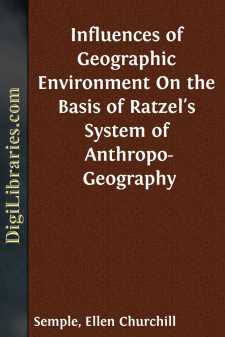Categories
- Antiques & Collectibles 13
- Architecture 36
- Art 48
- Bibles 22
- Biography & Autobiography 813
- Body, Mind & Spirit 142
- Business & Economics 28
- Children's Books 14
- Children's Fiction 11
- Computers 4
- Cooking 94
- Crafts & Hobbies 4
- Drama 346
- Education 46
- Family & Relationships 57
- Fiction 11829
- Games 19
- Gardening 17
- Health & Fitness 34
- History 1377
- House & Home 1
- Humor 147
- Juvenile Fiction 1873
- Juvenile Nonfiction 202
- Language Arts & Disciplines 88
- Law 16
- Literary Collections 686
- Literary Criticism 179
- Mathematics 13
- Medical 41
- Music 40
- Nature 179
- Non-Classifiable 1768
- Performing Arts 7
- Periodicals 1453
- Philosophy 64
- Photography 2
- Poetry 896
- Political Science 203
- Psychology 42
- Reference 154
- Religion 513
- Science 126
- Self-Help 84
- Social Science 81
- Sports & Recreation 34
- Study Aids 3
- Technology & Engineering 59
- Transportation 23
- Travel 463
- True Crime 29
Influences of Geographic Environment On the Basis of Ratzel's System of Anthropo-Geography
Categories:
Description:
Excerpt
Chapter I—The Operation Of Geographic Factors In History
Man a product of the earth's surface.Man is a product of the earth's surface. This means not merely that he is a child of the earth, dust of her dust; but that the earth has mothered him, fed him, set him tasks, directed his thoughts, confronted him with difficulties that have strengthened his body and sharpened his wits, given him his problems of navigation or irrigation, and at the same time whispered hints for their solution. She has entered into his bone and tissue, into his mind and soul. On the mountains she has given him leg muscles of iron to climb the slope; along the coast she has left these weak and flabby, but given him instead vigorous development of chest and arm to handle his paddle or oar. In the river valley she attaches him to the fertile soil, circumscribes his ideas and ambitions by a dull round of calm, exacting duties, narrows his outlook to the cramped horizon of his farm. Up on the wind-swept plateaus, in the boundless stretch of the grasslands and the waterless tracts of the desert, where he roams with his flocks from pasture to pasture and oasis to oasis, where life knows much hardship but escapes the grind of drudgery, where the watching of grazing herd gives him leisure for contemplation, and the wide-ranging life a big horizon, his ideas take on a certain gigantic simplicity; religion becomes monotheism, God becomes one, unrivalled like the sand of the desert and the grass of the steppe, stretching on and on without break or change. Chewing over and over the cud of his simple belief as the one food of his unfed mind, his faith becomes fanaticism; his big spacial ideas, born of that ceaseless regular wandering, outgrow the land that bred them and bear their legitimate fruit in wide imperial conquests.
Man can no more be scientifically studied apart from the ground which he tills, or the lands over which he travels, or the seas over which he trades, than polar bear or desert cactus can be understood apart from its habitat. Man's relations to his environment are infinitely more numerous and complex than those of the most highly organized plant or animal. So complex are they that they constitute a legitimate and necessary object of special study. The investigation which they receive in anthropology, ethnology, sociology and history is piecemeal and partial, limited as to the race, cultural development, epoch, country or variety of geographic conditions taken into account. Hence all these sciences, together with history so far as history undertakes to explain the causes of events, fail to reach a satisfactory solution of their problems largely because the geographic factor which enters into them all has not been thoroughly analyzed. Man has been so noisy about the way he has "conquered Nature," and Nature has been so silent in her persistent influence over man, that the geographic factor in the equation of human development has been overlooked.
Stability of geographic factors in history.In every problem of history there are two main factors, variously stated as heredity and environment, man and his geographic conditions, the internal forces of race and the external forces of habitat....


